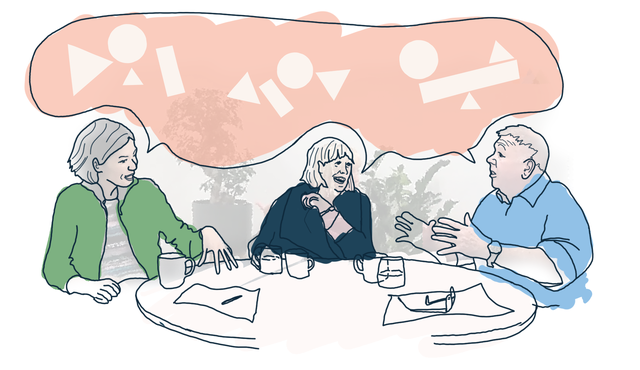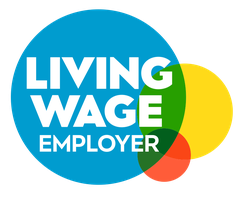The conditions for place-based success : Lessons learnt from a lifetime of community centred change

In our recent webinar, Dame Julia Cleverdon and David Sanderson, CEO of The Rank Foundation, shared their experience of delivering impactful change alongside communities and the conditions they found lead to success.
All communities have different challenges, and therefore, different solutions. However, during the webinar, the pair revealed some common needs across their experiences, these include; building strong collaborative relationships that engage all the key assets and actors in a community, finding and empowering the people in communities that are trusted by local people and are able to reach and engage the whole community, creating the funding conditions that give the space, time and trust to tackle the real causes of long term disadvantage, and the power to influence change in the system. Whilst these conditions can be nurtured within a geographical place, there is also extraordinary opportunity when people working in different places are connected to each other, and are given the time and occasion to support, learn from and advise each other in order to sustain this difficult work.
Personal Journeys into Place-Based Change
Both Dame Julia and David’s journeys into place-based change began with a commitment to understanding communities. David Sanderson’s transition from a military career to joining Rank in 2002 helped the organisation shift focus to a community-centric approach. His military experience in Southern Africa shaped his perspective on the importance of building relationships, ‘kicking the tyres’ and adapting strategies to suit local needs.
Dame Julia, as CEO of Business in the Community (BITC) from 1991 to 2007, took business leaders to visit community projects, fostering empathy and collaboration. In her work across multiple place-based and charitable organisations, including her role as Chair of Place Matters, Dame Julia connects and supports local leaders and entrepreneurs working towards positive change, who need additional resources.
Key Learnings from working with communities
Rebuilding Trust
Trust is crucial for effective cross-sector collaboration. Organisations from different sectors often have divergent missions, leading to competition and a lack of collaboration. Bridging these gaps requires open communication, mutual respect, and most importantly, time. The process is worthwhile, as when trust is built between people in places, the communities are in a much stronger position to thrive and grow together.
In David’s experience, joining Rank shortly after the Burnley riots, he prioritised meeting key community members to understand their perspectives, build relationships, and to identify who were the local leaders for change. In Dundee, despite initial resistance, he built strong relationships by demonstrating commitment and understanding to the local area and voices. This relationship building took time in order to gain the trust of communities, and for them to understand Rank’s mission was to tackle the real needs in these areas, as opposed to imposing a top down definition of success.
In addition, both parties discussed the importance of shared learning and collaboration, building trust between sectors and places. Dame Julia shared her experience of bringing together 20 leaders and people, ranging from public sector, community leaders, to police and beyond, from Burnley, Burslem, Stoke-on-Trent, Middlesbrough, Redcar and Tottenham at an all day conference. The morning began with people split into places, allowing localities to discuss their work together, and in the afternoon, people were split into sectors. The outcome of this cross-learning event was “a rich and mixed conversation and you suddenly realise that actually what Burslem had done [with] driving connections around the Middleport pottery had started something which is now happening in Middlesbrough” as places and initiatives had inspired one another and spread their success.
Allowing people time to connect and resonate with other people, places, and missions, is key to driving place-based work forward. Often communities work in isolation due to lack of capacity, and struggle to rise above competitive funding environments. As Dame Julia suggested:
“It’s not just connecting the unconnected it’s then connecting those who are on that journey together”
Backing the leaders local people trust
Successful place-based change requires diverse stakeholders, including public, private, and community sectors. Both Dame Julia and David the importance of identifying and involving key players early on which leads to more effective solutions.
David noted that larger charities and funders frequently miss real place-based change opportunities as they “lack the connection or understanding of what is happening on the ground” and fall into the trap of only funding the “usual suspects” and projects who are well-known and doing well. However, this can create competition, and pulls funding spotlights away from other organisations in the areas which also need the support and opportunity to build traction.
For Dame Julia:
“the best community entrepreneurs were actually those making the most difference, they weren’t national charities. They were two marvellous mums who set up an after school drop in club for whom they made cake, and nobody would have found them on a register … and they were the people, in my experience, that most need wind in their sails, power behind them, money to them and resources.”
The process of finding the local key actors takes time, compassion and in place involvement. There was an agreement that backbone organisations could play the supporting role in relationship building, as it offers unbias capacity to tap into new networks of people, something Place Matters has a growing experience of. It is key for connectors and funders to consider time and resources for this vital task when working in place-based work, as not all organisations have the capacity to shout the loudest. From the webinar, Dame Julia’s bottom line to funders is;
“you’ve just got to find where the local operators are and back them to the ends of the Earth.”
Trusting communities to know what will work
One of the most compelling points raised was the need to shift power from above to communities. Throughout David’s work at the Rank Foundation, he has emphasised the need for funders to be held accountable and for power dynamics to be addressed. The importance of acting on the real needs of the community through voice and co-design, in order to avoid: “imposing your will, your mission on people, [instead] lighting the fire from beneath”.
This approach was undertaken in Hull, learning from lessons in Dundee on bringing together community, involved co-designing a Theory of Change, which subsequently influenced an overarching shared mission within a cross-sector collaboration group. By producing shared goals and measurement together, it ensured that local needs were central and funders were held accountable for their commitments.
Be there for as long as it takes
The webinar stressed the absolute necessity of sticking it out for the long term. Crucial for cross-sector partnerships, is sustained effort and commitment. In Blackpool the success of the public-private partnership, despite taking over nine years, highlights the challenges and necessity of prolonged effort in place-based work engaging all the assets in a community. Shifting systems and supporting community-led initiatives takes time, as does the necessary relationship building necessary to understand real local issues and the most effective solutions.
Private and philanthropic sectors can offer more consistent longer-term support than the sometimes less stable Government funding that looks for results in an election cycle, but partnership across different funders creates the best potential conditions for sustained success.
Creating a local movement for change that influences the system
Shifting systems and supporting community-led initiatives require leveraging power and connections both locally and nationally. Dame Julia’s method of involving corporate leaders in their hometowns exemplifies how finding the right people can amplify support and impact. Local businesses can be important actors and sources of resources who are all too often not brought to the table in this work.
Whilst we are working to change systems and redistribute opportunity equally across our communities, there is occasionally a need to tap into the well-connected influencers and people in our networks. Both Dame Julia and David’s influence in casting the spotlight on unconnected communities, indicate clearly the enormous impact that the right people in the right place can have on this kind of work. It is key food for thought that there is a responsibility for all of us in this sector to rise above competition and credit seeking, and to share our networks and connections with those places that may not have had the attention they so desperately need to influence the systems that disadvantage them.
The Urgency of Place-Based Change
The urgency of place-based change is more pressing than ever. As Dame Julia noted, many communities are facing worsening conditions, with increasing unemployment and health issues. The same communities remain on the list of most challenged areas, indicating that traditional top-down approaches have not been effective.
The discussion demonstrates that we should believe it is possible to make change with communities, but the work is difficult and needs the sort of sustained and significant effort over many years that is rarely available in the current funding environment. We need to find a way of creating these conditions in our increasingly complex and interconnected world and show the many communities locked into disadvantage for decades that change is possible.
[1] : Deprivation in England, 1971–2020. C. D. Lloyd · P. D. Norman · D. McLennan. Applied Spatial Analysis and Policy (2023)https://www.ncbi.nlm.nih.gov/pmc/articles/PMC9667433/pdf/12061_2022_Article_9486.pdf (Accessed July 18 2024)
To view the full recording from the Place Matters webinar with Dame Julia Cleverdon and David Sanderson, please head over to view on our YouTube Channel, here.

